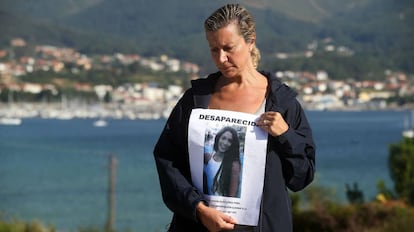Just where is missing Spanish teenager Diana Quer?
Eleven months after 18-year-old disappeared, police unblock her cellphone, raising hopes of new clues

Every Monday morning, between three and five members of the Civil Guard’s Central Operative Unit board a plane in Madrid and fly to A Coruña, the capital of the northwestern region of Galicia, where they crosscheck cellphone data that might provide a clue as to the whereabouts of Diana Quer, the 18-year-old from a well-to-do Madrid family who has been missing since August 22, 2016. The team’s investigation has been given new impetus this week after Quer’s cellphone, which was only found in October, was unblocked.

The officers also regularly return to follow up leads in the area around the village of A Pobra do Caramiñal, the Quer family vacation home, and where Diana was last seen after leaving the annual fiestas in the early hours of the morning 11 months ago. The team is still working full time on a case that has caught the headlines in Spain and has been provisionally shelved by the judge appointed to oversee it, a decision that was criticized by the Civil Guard. In turn, the judge has criticized the security forces over repeated leaks to the media about the investigation.
There is no evidence my daughter is not alive. And while there is none, we hope she will appear Diana Quer’s father, Juan Carlos Quer
“The investigation is still underway, and we cannot comment on it,” says Diana Quer’s father, Juan Carlos Quer.
The Quer family chose A Pobra do Caramiñal, a small coastal community of 10,000 people, as their summer destination 17 years ago. Diana’s parents divorced in 2003, but she and her sister and mother continued to spend August in the summer house the family owned in nearby Xobre.

Diana reportedly made friends with a group of locals her family describe as “on the edge of legality.” One of them was questioned in the days following Diana’s disappearance, while another, who had convictions for drug dealing, had his phone tapped and was followed. At least two other local men were investigated, but the judge decided there was not enough evidence to continue proceedings “against anybody in particular.” The decision to close the case in April was described by the Quer family as “sad.”
Diana Quer left the fiestas in A Pobra on foot around 2.30am, to head home. She was seen 15 minutes later passing an abandoned disco. She sent a text message to a friend at this time, saying that a gypsy who ran one of the stalls set up for the fiestas and who was camped nearby had called her over to him. The police followed up the lead, but no arrests were made.

The following morning, Diana’s mother reported her missing to the Civil Guard in A Pobra. She told officers who followed up the report that this was not the first time her daughter had run away (she once spent three nights at a friend’s house), but that these events had always been prompted by arguments.
There are few closed circuit or traffic cameras in A Pobra. Diana Quer’s cellphone was tracked as having traveled along a stretch of road heading toward the mainland, but the signal was lost in Taragoña, some 10 kilometers away. Cameras on the main road were unable to distinguish the make or color of vehicles passing by in the early hours. Two fishermen in Taragoña told authorities they saw a young woman get out of one car and into another. When contacted by the media they met journalists in a local hotel and asked for €25,000 for an interview.
“There is no evidence that my daughter is not alive. None. And while there is none, we wait and hope that she will appear and that when she does, she is well,” says her father.
English version by Nick Lyne.
Tu suscripción se está usando en otro dispositivo
¿Quieres añadir otro usuario a tu suscripción?
Si continúas leyendo en este dispositivo, no se podrá leer en el otro.
FlechaTu suscripción se está usando en otro dispositivo y solo puedes acceder a EL PAÍS desde un dispositivo a la vez.
Si quieres compartir tu cuenta, cambia tu suscripción a la modalidad Premium, así podrás añadir otro usuario. Cada uno accederá con su propia cuenta de email, lo que os permitirá personalizar vuestra experiencia en EL PAÍS.
¿Tienes una suscripción de empresa? Accede aquí para contratar más cuentas.
En el caso de no saber quién está usando tu cuenta, te recomendamos cambiar tu contraseña aquí.
Si decides continuar compartiendo tu cuenta, este mensaje se mostrará en tu dispositivo y en el de la otra persona que está usando tu cuenta de forma indefinida, afectando a tu experiencia de lectura. Puedes consultar aquí los términos y condiciones de la suscripción digital.








































